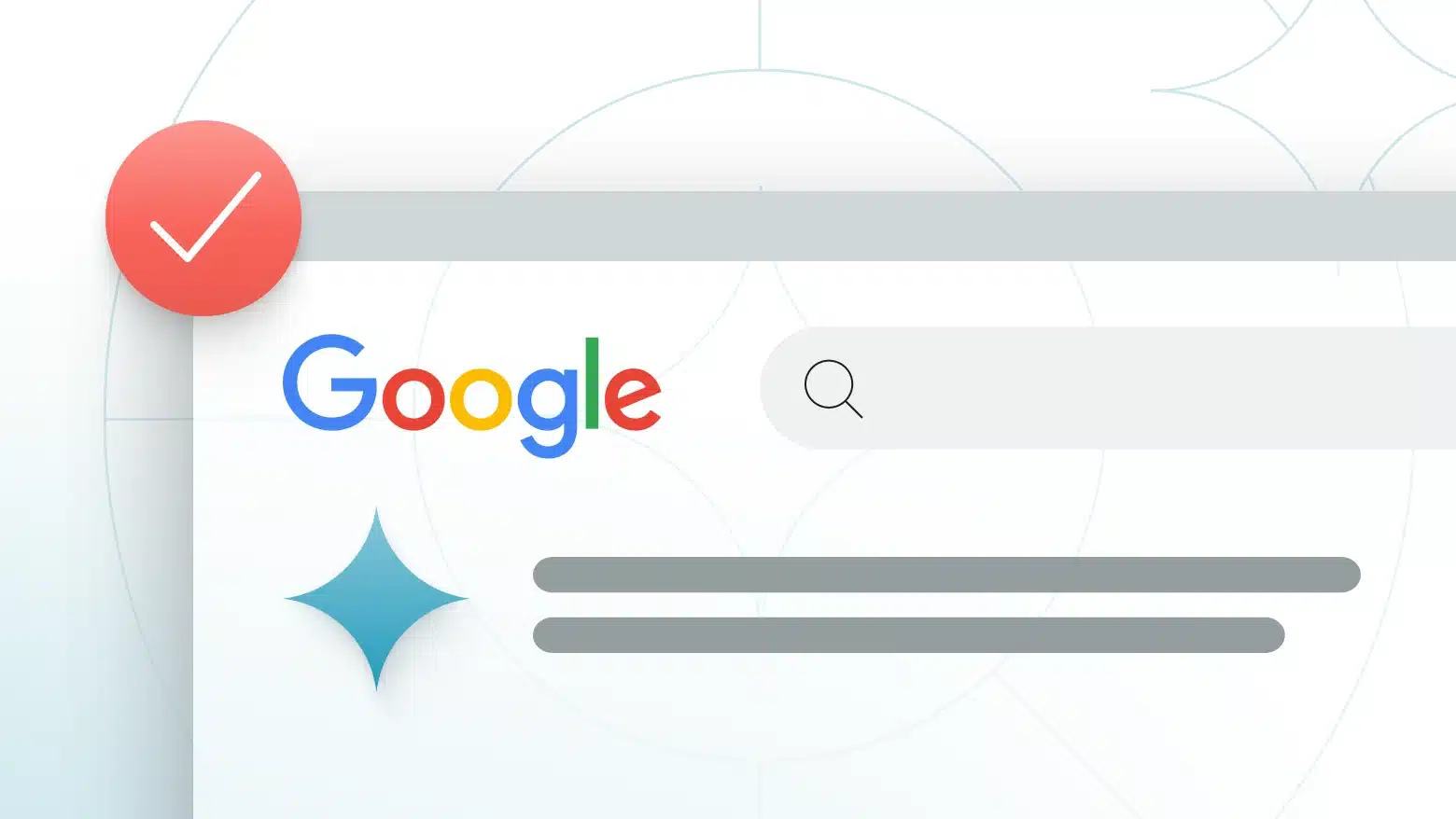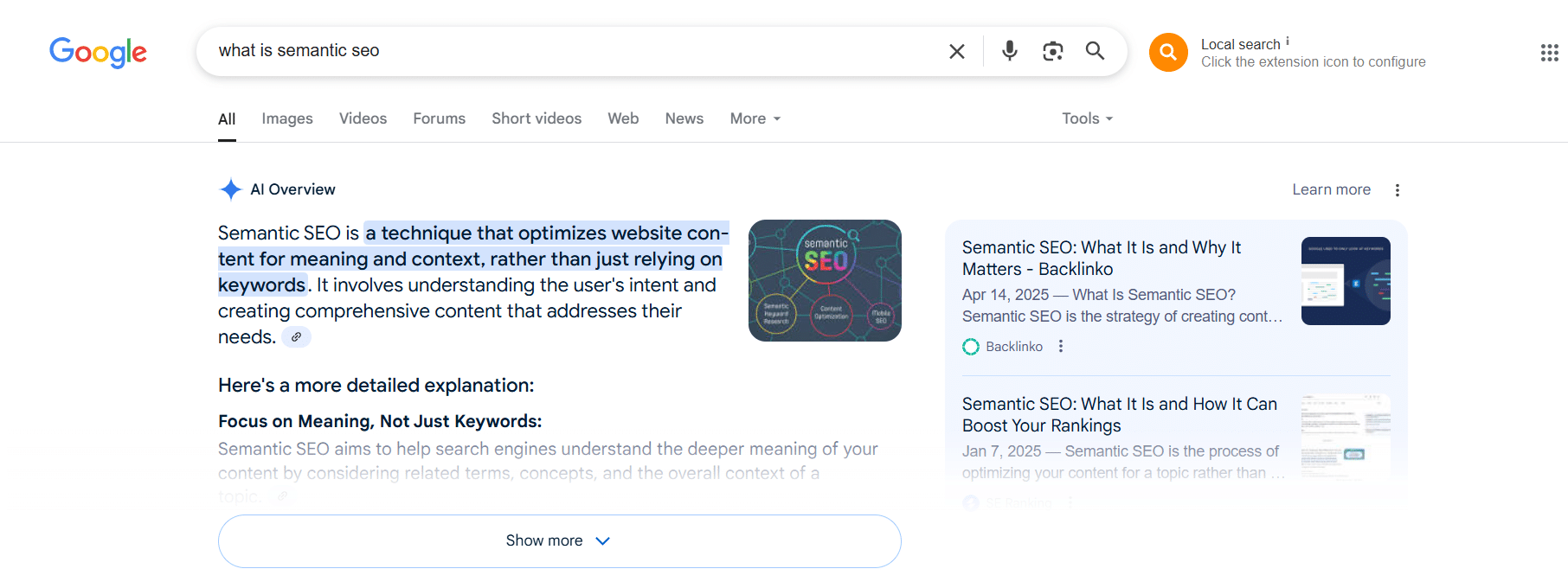SEO Tips
June 4, 2025

• SEO professionals in May 2025: “Ah, finally, a quiet month.”
• Google: drops AI Overviews
And just like that, the search landscape shifted—again! Since “AI Overviews” landed on Google in May 2025, the SEO gurus haven’t stopped talking about it. You can’t scroll through LinkedIn without seeing someone dissecting their impact or panicking about rankings. But what exactly are AI Overviews—and are they here to ruin SEO or reinvent it? These are some of the topics we will chat about in this blog.
AI Overview (formerly known as Search Generative Experience or SGE) is Google’s most significant search evolution since featured snippets that uses generative AI to provide a direct answer to your search queries. Sounds amazing, right? Well, yes and no.
Indeed, it makes searching a lot easier for users; however, if you are trying to rank, you will not be pleased that the AI overview appears at the top of the SERP just like that. Therefore, the introduction of this feature is fundamentally changing how users interact with search results and how businesses must approach SEO strategy from now on.

So, how does AI Overview actually work? According to Google Search Help, “AI Overviews use generative AI, which is a type of artificial intelligence that learns patterns and structures from the data it is trained on and uses that to create something new.” Meaning that, if you were to type in a question, say, “What are the best SEO practices in 2025?” The system kicks in, powered by Google’s LaMDA and PaLM models, and dives into a sea of books, web pages, and reliable sources. It finds the most trustworthy content, fact-checks it, and stitches together a fresh, easy-to-read answer. It’s picky, too, preferring structured content, expert sources, and pages that load fast. In short, you can think of it as Google’s way of saying, “Hey, let me summarize the internet for you.”
However, while it is awe-inspiring, this technology is still improving, so it may provide inaccurate information. Google Search Help warns: “AI Overviews can and will make mistakes.”
The short answer would be: because it’s flipping the script. For years, SEO followed a familiar path: develop quality content, earn valuable backlinks, aim for top 10 rankings, and strive to attract meaningful clicks. But AI Overviews just walked in like, “Thanks for your efforts—I’ll take it from here.” And now, instead of users scrolling through links, they’re now getting instant, AI-generated summaries right at the top. It’s faster for users, sure, but for SEOs? It’s a wake-up call! The traditional pursuit of first-page glory may no longer suffice, and suddenly, visibility means something entirely different—and adapting isn’t optional; it’s survival.
It means the SEO landscape just got a dramatic plot twist! With AI Overviews stepping in, it’s not just about ranking anymore—it’s about being cited. Google’s AI pulls from content it deems accurate, structured, and well-supported, which means if your page isn’t clear, credible, and with valuable content, you might get left out of the conversation entirely.
Plus, we’re now juggling five fronts to stay visible in the age of AI-driven search:
• SEO: The core of it all. Ranking for high-intent keywords on Google is still essential.
• AIO (AI Optimization): Getting picked up by AI models like ChatGPT, Claude, and Gemini.
• GEO (Generative Engine Optimization): Ensuring your content is a trusted source for AI-driven answers.
• AEO (Answer Engine Optimization): Becoming the go-to answer in Google’s AI Overviews.
• SXO (Search Experience Optimization): Ensuring users stay, engage, and convert after they click.
Google is also introducing a new feature within the Google Search Console that provides insights into how your site is performing in AI Overviews. This new feature will allow you to track how often your content is featured in AI-generated answers, giving you a better understanding of your visibility.
SEO now is about being the source AI trusts enough to summarize—being a top result isn’t enough; you need to be the answer. So, if your content can’t pass the “would AI quote this?” test, it’s time to rethink the strategy.
Change is never easy, but at Chain Reaction, we’re nothing if not adaptable!
We’re not just keeping up with AI Overviews—we’re already designing SEO strategies to thrive in their world. Our new approach goes beyond ranking; it’s about making sure our clients’ websites get cited and summarized in AI-generated answers. We’re focusing on building content with clear topical authority, fine-tuning schema to speak the language of AI crawlers, and crafting pages that deserve to be cited, not skipped. We’re shifting from a keyword-first to a credibility-first approach.
For now, our clients may notice that traditional KPIs, such as organic clicks, may dip, even if they’re still ranking well. However, the gain is more meaningful: qualified traffic with clearer intent; AI filters out noise, which means users reaching your site are more likely to take action.
At Chain Reaction, we help you adapt by shifting how performance is measured. We now track AI-specific visibility: “answer presence,” featured snippet wins, and co-citation frequency.
So, what can you do as a business in this new era of AI-powered search? Start by prioritizing structured content that’s easy for machines to digest—and publish it on high-authority platforms that Google (and its AI) actually trust. Commit to regular AI-readiness audits to ensure your content stays optimized for evolving formats, and don’t forget to integrate rich media that boosts visibility. And hey, we’re not leaving you to figure it out alone—join our upcoming client webinar, “Winning in the Age of AI Search: Practical Steps for 2025,” to get real tips on how to optimize your strategy.
AI Overviews aren’t just another feature—they’re rewriting the rules. At Chain Reaction, we’re not just reacting; we’re evolving, ensuring your brand isn’t only visible but also trusted, cited, and AI-ready. The search game is changing fast… and we’re here to help you stay ahead, not catch up.